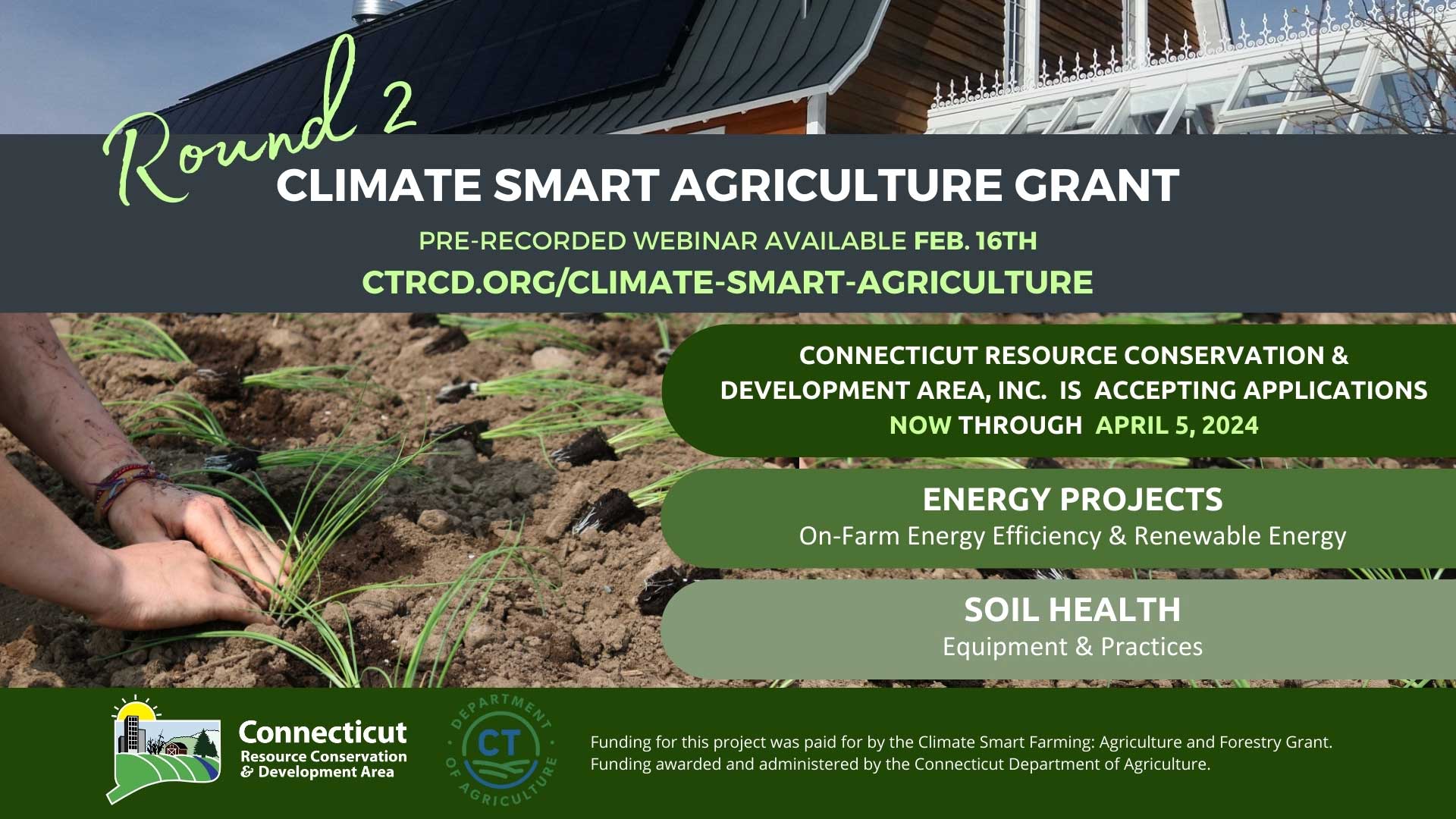Climate Smart Agriculture Grant
QUESTIONS?
Do you have questions about the CT RC&D Climate Smart Farming Grant program and/or the grant application? Email Sarah Layton, Agricultural Programs Coordinator, at slayton@ctrcd.org or call 860-345-3977 ext. 102.
2024 Grant Guidance

Watch Our Webinar for a Complete Introduction
*When you come to the webinar screen, please enter the passcode: fW$%sxA8
Please consult the following for guidance regarding CT RC&D’s Climate Smart Agriculture Grant program, which intends to award grants to farmers for the implementation of on-farm energy projects (energy efficiency & renewable energy) and/or soil health equipment and practices. Each project should include one or more components of climate smart farming. Examples can be found in the Award Amount and Approved Purposes section below, as well as Natural Resources Conservation Service (NRCS) Climate-Smart Mitigation Activities HERE.
The guidance below is separated into drop-down menus for ease of viewing; however, you can also download a full PDF version HERE.
CT RC&D launched the first CSAG funding period in the Summer of 2023, and is now opening a second round of funding to apply for in early 2024.
There are two application funding tiers available to apply for in this round:
TIER ONE
Eligibility
New/Beginning (1-3 years) and Established (3+ years) Farms
Award Amount
$5,000 to $25,000
Cash or In Kind Match Requirement
25% Soil Health, 50% Energy*
Project Duration
1 year from time of award to implement/install and 1 year of monitoring post-implementation/installation.
TIER TWO
Eligibility
Established (3+ years) Farms
Award Amount
$25,001 to $50,000
Cash or In Kind Match Requirement
25% Soil Health, 50% Energy*
Project Duration
1 year from time of award to implement/install and 1 year of monitoring post-implementation/installation.
*Grant applicants are encouraged to seek matching funds support through other state and federal funding opportunities, such as: USDA REAP Grants, Energize CT Incentives, municipal electric company incentives, CT Renewable Energy Solutions Program, CT Green Bank loan, USDA NRCS EQIP program incentives, etc. Underserved farms, as defined by DOAG for the purpose of this grant, who are unable to secure all matching funds, may submit a request for accommodation as a supporting document to this application.
The following entities are eligible to apply for the Climate Smart Agriculture Grant:
- Agricultural producers, including aquaculture and forestry producers, singularly or jointly, whether such producers are owners or tenants of existing agribusiness within the State of Connecticut
- Agricultural cooperatives, non-profit organizations, municipalities, and sole proprietors applying cooperatively with an agricultural producer
- All production types, including conventional/organic, indoor/outdoor, soil/water, urban/rural, etc.
- New/beginning farms* (operations in production 1-3 years)
* For the purpose of this grant, New/Beginning Farms are defined as those that have been both in operation and production for at least one full year prior to the application submission date. If you are applying for the April 2024 deadline, your current farm company must have completed the following prior to April of 2023:
— Registered as a business with the CT Secretary of State’s office or have obtained a Notarized Certificate of Trade Name through the applicant’s Town Clerk,
— Acquired the Farmers’ Tax Exemption Permit through the CT Department of Revenue Services,
— One full year of production on the farm business property (whether owned or rented) where the proposed project will be implemented/installed (in production since 2023). - Established farms (operations in production 3+ years)
- Priority points will be given to projects which support historically underserved farmers*, including BIPOC producers, veterans, new and beginning farmers (farming for 1-3 years), anyone in a protected class, anyone who speaks English as a second language.
*As defined by the CT Department of Agriculture for the Climate Smart Agriculture and Forestry Grant funding.
Applicants must provide a copy of the following:
- Farmers’ Tax Exemption Permit through the CT Department of Revenue Service.
- If operating as a business: Active Business Status with the CT Secretary of State’s office. Applicants must visit the Secretary of State’s website and perform a Business Records Search with their business name. Applicants must open the results for their business listing and provide a digital copy of the Business Details page with the grant submission.
- If operating as a sole proprietor: Notarized Certificate of Trade Name through applicant’s Town Clerk.
- Copy of Crop Plan submitted to DOAG (if applicable)
Please note:
- If an applicant applied for a CT RC&D-administered CSAG award in the first round of funding and were NOT awarded, they are eligible to reapply with the same or a new project.
- If an applicant received a CT RC&D-administered CSAG award in the first round of funding, they are not eligible to apply for this second round of funding.
- If an applicant has received a CSAFG award from another CT DOAG sub-granting organization, they are eligible to apply for this CT RC&D CSAG round. However, to be considered for funding, CT RC&D and CT DOAG will need to confirm with other CSAFG grantor(s) to ensure the proposed project does NOT overlap with the previously funded project, and that the funding covers separate projects with separate expenses for each project.
- Only one application per farm business will be accepted.
- Statewide (project must be on a farm business BOTH located in Connecticut AND registered as a business in Connecticut)
- Owned property
- Leased property (the Landlord Consent Agreement authorizing the proposal must be submitted with the application)
Grant awards will not exceed $25,000 for Tier 1 and $50,000 for Tier 2 per farm applicant. Only one application per farm business will be accepted. Funds must be used to implement, support, or expand climate smart agricultural practices related to on-farm energy (energy efficiency and renewable energy) and/or soil health equipment and practices. The use of funds must be toward an approved purpose and related to the proposed project.
Examples of soil health equipment and practices that reduce emissions and enhance soil carbon sequestration include but are not limited to:
- Planting of cover crops
- Conservation crop rotation
- Conservation tillage (no-till/low till)
- Mulching
- Composting
- Nutrient management
- Improved grazing and pasture
- Land management
- Purchasing equipment to directly improve soil health
- Additional examples can be found in the National Resources Conservation Services (NRCS) Climate-Smart Mitigation Activities.
Examples of energy projects include but are not limited to:
- Increasing on-farm energy efficiency
- Upgrading to energy-efficient lighting
- Replacing dated coolers/freezers with energy-efficient equipment
- Installing solar panels to offset farm electricity usage
- Per CT DOAG, solar projects cannot be installed on soil classified as Prime, Important, or Locally Important soils. All proposed ground mounted solar projects must include:
- Justification for why a roof mounted system cannot be supported (ex. Building lacks structural integrity, etc.)
- Soil Map with the project location (including any trenching) clearly outlined within the “Not Prime Farmland” area. Web Soil Survey is a free and approved mapping tool.
- Purchasing solar-powered equipment (ex: solar tractor)
- Installing solar-powered ventilation for high tunnels
- Implementing renewable energy projects (ex: geothermal, heat pumps)
- Per CT DOAG, solar projects cannot be installed on soil classified as Prime, Important, or Locally Important soils. All proposed ground mounted solar projects must include:
Funds from this grant must be paid directly to the farm applicant awardee.
Eligible uses of funding; expenses that can be used as a match if they directly and meaningfully support the proposed project:
- Equipment purchases* and rentals to support implementation of climate-smart farming practices as outlined in this application
*Used equipment purchases are allowable so long as they are in good working order; an extended warranty is preferred.
*Funds may be used to purchase only American-made equipment or products. If the applicant is interested in purchasing non-American-made products, justification as to why American-made equipment is not available/preferred must be included in grant narrative.
- Materials and supplies specifically related to the project
- Employee* wages and fringe benefits related to the implementation and execution of the proposed project
*Owner wages and/or time may be included as an in-kind match but will not be compensated directly by this grant
- Hired contractors and consultants’ time related to the proposed project
- Stipends for student and/or intern work related to the proposed project
- State/local/federal permits related to the proposed project
Ineligible uses of funding; expenses that cannot be used as a match:
- Projects and practices that have been implemented/installed prior to the application, or those that are currently in the implementation/installation phase
- Any expense incurred prior to contract execution
- Land acquisition or mortgages
- Cost of borrowing (points and other fees)
- Expenses related to establishing a new organization/business
- Any portion of expense for which the applicant pays a contractor in merchandise or service in lieu of cash
- Tuition/tuition reimbursement or career-related/scholarship funds
- Routine business expenses (utilities, office supplies, etc.)
- Goods and supplies (office, farm, otherwise) unrelated to the project
- Legal expenses
- Indirect or contingency costs of any percentage
- Purchasing one’s own product or service
- Income taxes
Grant awardees are required to sign a contract governing the terms of their awarded grant. Contracts will be provided upon selection for award. Upon contract signing, grant awardee will receive an initial 50% of award payment, payable directly to the farm business applicant. The remaining 50% of the award will be reimbursed to the applicant upon favorable review of the second semi-annual report and CT RC&D/CT DOAG site visit once the project is fully implemented/installed.
Grant recipients are allotted one year from the contract date to implement/install the project. This is followed by one year of required monitoring/reporting to CT RC&D.
Contract and project extensions are not allowed. Additionally, recipients will be monitored by CT RC&D to ensure project deliverables are adequately implemented and reported.
Applicants of awarded projects will be responsible for the following:
- Signing a contract with CT RC&D.
- Providing a certificate of insurance holding CT RC&D harmless and listing both CT RC&D as well as CT DOAG as an additional insured on the grantee’s general liability insurance policy in the amount of $1,000,000 or more. CT RC&D reserves the right to deem alternative insurance coverage to be acceptable in its sole and absolute discretion.
- Providing documentation of Workers’ Compensation Insurance for the duration of the project for any proposed budget that includes employee wages.
- Implementing/installing the project within one year.
- Submitting three semi-annual reports assessing project status and itemizing current and anticipated expenses. Copies of invoices and proof of payment must be submitted with the first and second semi-annual reports.
- Allow site inspections from CT RC&D and CT DOAG. The first will take place once the project is complete and prior to final payment being released. A second site inspection may occur during the monitoring period.
- Submitting a final report measuring project impact.
- Other requirements as outlined in the CT RC&D contract.
If awarded, failure to provide the necessary information to establish an agreement, or failure to sign and return a completed grant contract package by the deadline provided at the time of contract issuance, may result in CT RC&D rescinding the award and reallocating the funds back to the program.
As the funding agent, CT DOAG requires CT RC&D to submit reports on the progress of the sub-grant program. As such, any applicant awarded a CT RC&D Climate Smart Agriculture Grant must submit to CT RC&D semi-annual and final reports by the deadlines outlined below.
Three Semi-annual reports, using the Progress Report and Financial Report templates provided at time of contract, must be submitted by the specified due dates.
A Final Report, using the Final Report and Final Financial Report templates provided at time of contract, must be submitted at least thirty (30) days prior to the expiration of the contract.
After the proposed project has been successfully implemented/installed, representatives from CT RC&D and CT DOAG shall be entitled to conduct at least one site visit to confirm completion of the contract.
Please note, the tables below provide a general timeframe; specific deadlines will be outlined in awarded contracts.
Implementation Phase
| Action | Deadline |
| Contract Signing | Spring/Summer 2024 |
| Initial Disbursement (50%) of Funds | Spring/Summer 2024 |
| First Semi-Annual Report Due | Fall/Winter 2024 (6 mo. following contract execution) |
| Project Installation/Implementation | Spring/Summer 2025 |
| Second Semi-Annual Report Due | Spring/Summer 2025 (12 mo. following contract execution) |
| Site Visit conducted by CT RC&D and CT DoAG | Spring/Summer 2025 |
| Following completion of project, request for Final Disbursement (50%) of Funds | Summer/Fall 2025 |
Monitoring Phase
| Action | Deadline |
| Third Semi-Annual Report Due | Fall 2025 (18 months following contract execution) |
| Possible Site Visit conducted by CT RC&D and CT DoAG | Spring/Summer 2026 |
| Final Report | Summer 2026 (2 years following contract execution) |
Questions?
Do you have questions about the CT RC&D Climate Smart Agriculture Grant program and/or the grant application? Email Sarah Layton, Agricultural Programs Coordinator, at slayton@ctrcd.org or call 860-345-3977 ext. 102.

